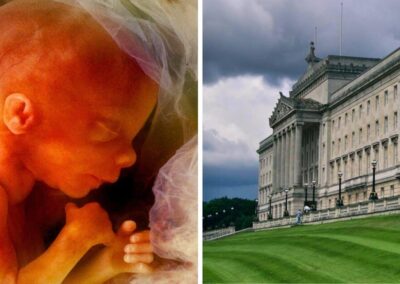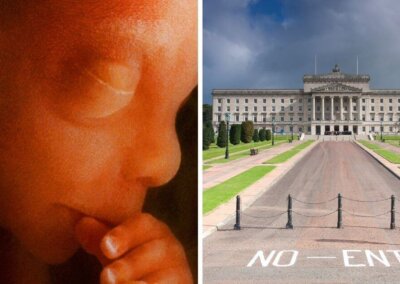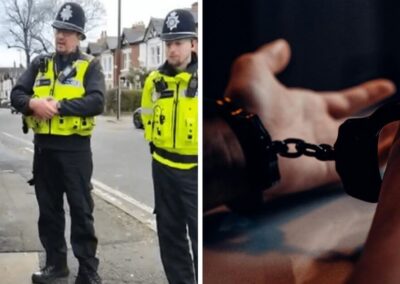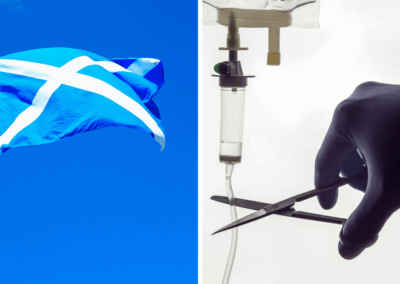A Minister in Northern Ireland is planning to attempt to implement censorship zones around hospitals and clinics performing abortions in the region.
The Government in Westminster imposed abortion on Northern Ireland in March last year. Over that year there were 1,345 abortions in the region. Now, Justice Minister Naomi Long is exploring possibilities for introducing ‘censorship zones’ outside abortion centres in Northern Ireland similar to those in place in other parts of the UK.
At various abortion clinics across Britain (and now Northern Ireland), small groups of pro-lifers have held vigils to offer practical assistance and alternatives to abortion for those who want it. In one of the most high profile cases, Alina Dulgheriu, who herself chose not to have an abortion after being offered help outside an abortion clinic in London, took Ealing Council to court over the Public Space Protection Order (PSPO) that criminalised the free assembly of persons and the offering of help outside of abortion clinics in Ealing.
The Court found that the appellant’s rights to assembly, religion, thought, expression and the reception of information were violated by the PSPO. Nevertheless, they ruled that such violations were justified because of the right to privacy of Marie Stopes attendees not to be seen in public.
“We will never stop actively protecting unborn babies — when and wherever their lives are in danger of abortion”
Justice Minister Long is now intent on introducing something similar into Northern Ireland. She said:
“Those who protest outside health trust premises which are delivering abortion-related advice and services are impacting not only on the wellbeing of women at a very vulnerable time of their lives but on all those who are attending these health facilities for many other reasons”.
She added that she intends to work with the Executive to develop a legislative approach to this issue.
Pro-life charity Precious Life, however, said: “The right to freedom of assembly and right to freedom of expression are fundamental human rights”.
“Precious Life’s vigils will continue offering help and life-affirming alternatives to women outside the abortion centres”.
“We will never stop actively protecting unborn babies — when and wherever their lives are in danger of abortion”.
Abortion in Northern Ireland
In the last eighteen months, Northern Ireland has witnessed dramatic changes to its abortion law. In a move with widespread public and political opposition in Northern Ireland, MPs in Westminster voted to impose abortion on the region in the absence of an Executive.
In the year since abortion was made legal in March 2020, there have been 1,345 abortions in the region. At the same time, the Severe Fetal Impairment Abortion (Amendment) Bill passed its second stage at the Northern Ireland Assembly by 48 votes to 12.
The Bill proposes removing the current grounds in the abortion regulations that were imposed on Northern Ireland by the British Government in 2020, which allow abortion for babies with disabilities including Down’s syndrome, cleft lip, and club foot. The Bill has received widespread popular support with over 28,000 people signing a petition calling on political leaders in Northern Ireland to vote for the Severe Fetal Impairment Abortion (Amendment) Bill.
Right To Life UK spokesperson, Catherine Robinson, said: “The rapid changes to the abortion law in Northern Ireland over the past eighteen months have been astounding. What is more astounding though is that very little of it has come from the people or politicians of Northern Ireland itself. Furthermore, the Minister for Northern Ireland has just been given sweeping new powers to implement abortion policy in Northern Ireland. All of this has been done with utter contempt for the devolution settlement that makes abortion a devolved issue”.
“Minister Long is attempting to impose restrictions on pro-lifers who are attempting to offer help and an alternative to abortion. Wherever harassment occurs, it can and should be investigated and punished under the law. There already exist laws to prosecute this activity. This is part of the reason that the former Home Secretary, Sajid Javid, refused to implement a national censorship zone policy in England and Wales. However, the fact remains that there exists no evidence of genuine harassment of women outside abortion centres in the UK. If there were, we would know about it as it would be used as evidence for the need of precisely this kind of legislation”.












